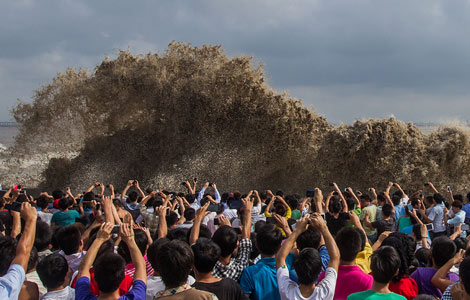Thailand sees no quick end to political impasse
Updated: 2013-12-24 14:13
(Xinhua)
|
|||||||||||
BANGKOK - Thai political conflict, which originated from inside the parliament and later spilled onto the streets of Bangkok and beyond, is becoming a complicated and precarious phenomenon.
The situation has gone from bad to worse over the last few months since legislation designed to grant amnesty to all politically-related accused people backfired and triggered massive anti-government street protests in the heart of the Thai capital and its suburban areas.
Former Thai leader Thaksin Shinawatra, ousted in a coup in 2006 and went into exile since, has reportedly quietly pushed for quick passage of that legislation. This put the government headed by his sister, acting Premier Yingluck Shinawatra, under fire from all said sectors, including pro-government Red Shirt activists.
The prolonged street demonstrations and seizure of government premises by the protesters, headed by former deputy premier Suthep Thaugsuban and several former legislators of the opposition Democrat Party, prompted Yingluck to dissolve parliament and call a snap election earlier this month.
Though military leaders, practically independent of Yingluck who is concurrently defense minister, reassured that they will abide by the rule of law, refuse to take side in the political conflict and categorically dismiss possibilities of staging a coup to overthrow the elected government, the crisis might probably aggravate, let alone be solved eventually, said pundits.
It remains to be seen whether the snap poll, scheduled for February 2, will ever take place since anti-government protest leader Suthep and his followers, who call themselves the People's Democratic Reform Committee, has intended to do anything to abort it.
STRUGGLE TO UPROOT "THAKSIN'S RULE"
Many people blame the political stalemate on Thaksin, who has lived in self-imposed exile overseas since he was sentenced in absentia in 2008 to a two-year jail term by the Supreme Court on corruption charges over a property deal.
The aborted bill, which led to the downfall of the Yingluck government, is said to be designed to pave the way for Thaksin's return and the pardon of those facing charges arising from Thailand's political turmoil from 2004 to 2010. It was also criticized for exonerating former premier Abhisit Vejjajiva and former deputy premier Suthep who allowed the army to use live ammunition to disperse protesters in 2010 when the Democrat party held power.
The putsch against the elected government was aimed at uprooting "Thaksin's rule" once and for all, said Suthep, who has asked the powerful military to help him do it one way or another.
A deeply polarizing figure in Thai politics who drew huge support from the country's rural poor but strong opposition from other social sectors, Thaskin has allegedly helped guide policy from abroad since Yingluck government took office in August 2011.
"The Yingluck government was no longer justified to run the country since it disrespected the Constitutional Court's verdicts while putting the country under Thaksin's rule," said the protest leader.
That referred to the court's ruling as "unconstitutional" the government-led amendment of the 2007 constitution to have all future senators elected by constituents nationwide instead of seeing one half of them picked by the people and the other half appointed by the heads of independent agencies as currently stipulated in the charter.
Such judgment merely rubbed salt into wound of the lameduck government as the judicial branch was widely alleged of interfering in the affairs of the legislative branch, analysts said.
Suthep repeatedly vowed to keep "people's revolution against Thaksin's rule," a prolonged massive struggle though an arrest warrant has issued for him on rebellion charges regarding the protester's occupation of government premises.
IN PURSUIT OF UNELECTED RULE
Suthep and his followers pressed the acting premier to resign and relinquish her caretaker government so that "people's council" could be set up and replace her with an unelected prime minister to run the country until "national reform" has been finished.
Yingluck maintained that the dissolution of the lower house of parliament to return the power to the people under democratic rule was the final concession of the besieged government to protesters and that she is constitutionally obliged to perform as acting head of the caretaker government until a post-election cabinet is set up.
"We have conceded so much that we have no idea as to what more could be conceded....we're merely asking for justice," said the embattled premier.
She suggested last Saturday the establishment of a national reform council immediately after the February 2 election, while major opposition Democrat Party decided to boycott the election, insisting the polls be postponed until a political reform is carried out, said party leader Abhisit Vejjajiva.
This apparently failed to satisfy the protesters who seem to believe that the pro-Thaksin Pheu Thai Party will likely come back as the core of a future coalition government.
"The prime minister should sacrifice by promising to the people that she and all members of the Shinawatra family will no longer get involved in politics," said Somchai Sawaengkarn, one of opposition senators.
But such demands were tantamount to a defacto coup without the use of military force and without due regards to the rule of law to topple an elected government and replace it with an unelected one, commented political scientist Prachak Kongkirati of Thammasat University.
Related Stories
Thai protesters disrupt candidates 2013-12-24 07:16
Protesters swarm in Bangkok to demand PM resign 2013-12-23 11:16
Thai rallies maintain pressure 2013-12-23 07:27
Thai opposition party to boycott election 2013-12-21 19:25
Thai political turmoil raises int'l concerns 2013-12-18 19:01
Protesters in Thailand want a year for reform 2013-12-14 07:59
Today's Top News
China's top 10 scandals in 2013
Chinese merchant killed during robbery in Russia
Private clubs are targeted by anti-graft campaign
US tries to shift spying blame
China makes it easier to sue government
Lawmakers near to ending laojiao
Policies to assist those who lost child
China's moon rover flexes muscles
Hot Topics
Lunar probe , China growth forecasts, Emission rules get tougher, China seen through 'colored lens', International board,
Editor's Picks

|

|

|

|

|

|





